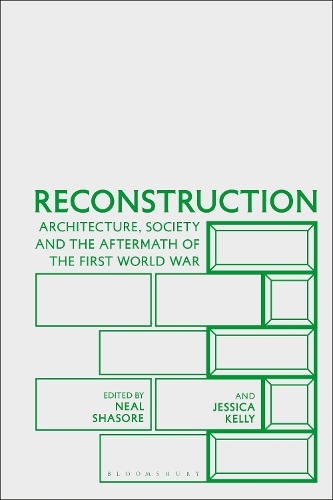
Reconstruction: Architecture, Society and the Aftermath of the First World War
(Paperback)
Publishing Details
Reconstruction: Architecture, Society and the Aftermath of the First World War
By (Author) Neal Shasore
Edited by Jessica Kelly
Bloomsbury Publishing PLC
Bloomsbury Visual Arts
25th July 2024
United Kingdom
Classifications
Tertiary Education
Non Fiction
720.9410904
Physical Properties
Paperback
408
Width 156mm, Height 234mm, Spine 28mm
885g
Description
Reconstruction explores the impact of the First World War on the built environment examining the immediate and longer term aftermath of the Great War on the architecture of Britain and the British Empire during the interwar years. While much attention has been paid by historians to post-war architectural reconstruction after 1945, the earlier developments of the interwar period (1919-1939) have been comparatively overlooked. This volume reveals how the architectural developments of this period not only provided important foundations for what happened after 1945 they are also of real significance in their own right. Sixteen essays written by leading and emerging scholars bring together new and diverse approaches to the period a period of reconstruction, fraught with the challenges of modernity and democratisation. The collection considers the complex effects of reconstruction on design, discourse, practice, and professionalism, and deals with the full spectrum of architectural styles and approaches, privileging neither Modernism nor traditional styles like the neo-Georgian. It brings to the fore social and political histories of the built environment, and makes important postcolonial interventions into the architectural history of British Imperialism at home and in its far reaches; in Cairo, South Africa, Australia, and India.
Reviews
It has taken nearly a hundred years for the history of interwar British architecture to be discussed widely in an even-handed and pluralistic manner. Reconstruction takes a significant step towards mapping the territory and demonstrating how it can be done. * Alan Powers, London School of Architecture, UK *
Looking beyond the well-known architectural icons of the 20s and 30s, this detailed examination of many previously overlooked buildings of a key period, gives a broader understanding of architectural practice and richly demonstrates the ways in which the study of architecture can reveal and tell complex stories about a rapidly changing society. * Catherine Croft, Director of C20 Society, UK *
Author Bio
Neal Shasore is Leverhulme Early Career Fellow at the School of Architecture, Liverpool University. Jessica Kelly is Senior Lecturer in Contextual and Theoretical Studies in Design at The University for the Creative Arts, Farnham.
